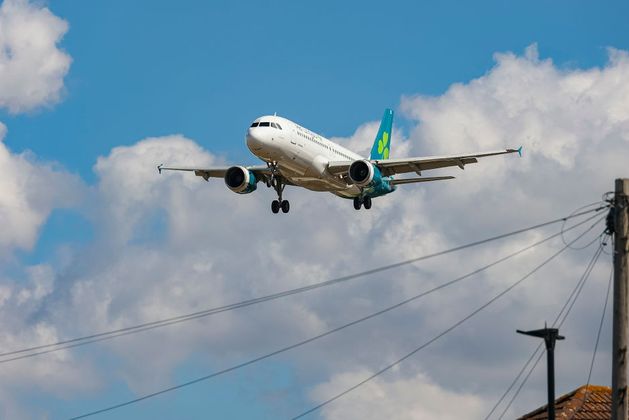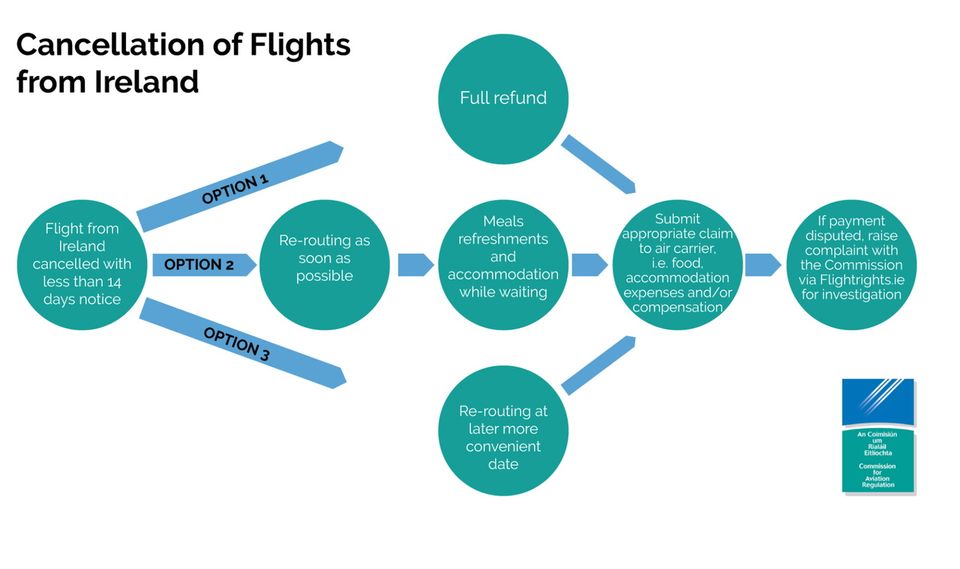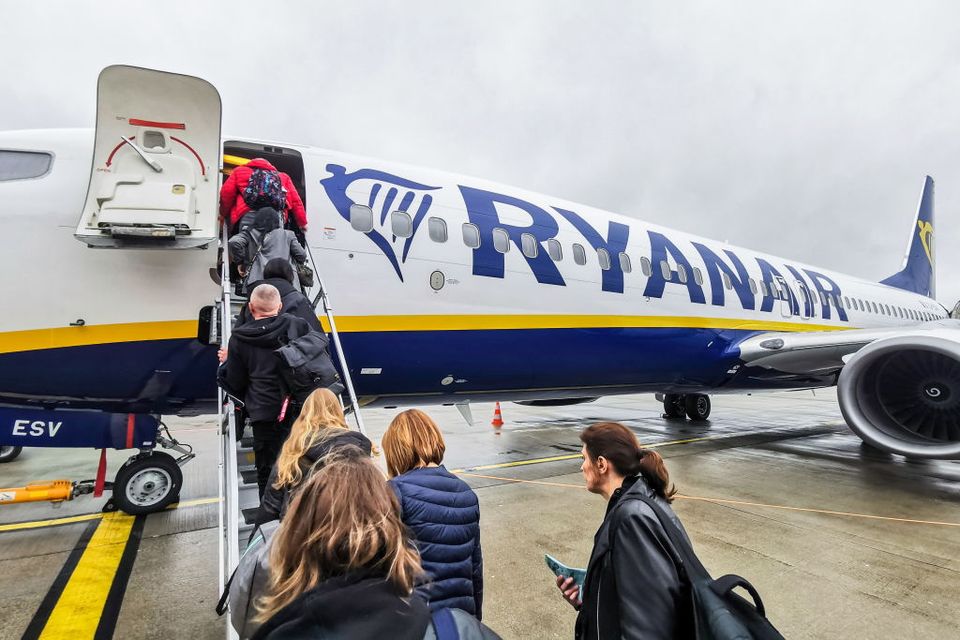Travel
Aer Lingus industrial action: Your rights if flights are cancelled or delayed

When flights are cancelled or delayed, passengers have rights to refunds, re-routing, care and in some cases compensation
So what exactly are your rights if your flight is affected?
The rights of passengers in the event of cancelled or delayed flights are set out under EU Regulation 261/2014.
How do I know if my flights are affected?
In the event of a strike or cancellation, airlines should contact affected passengers by email or SMS.
You can also check the airline website (under the ‘manage my booking’ section), and your airport’s online departures boards.
What are my rights if my flight is cancelled?
If your flight is cancelled for any reason, and regardless of when you are notified, your airline must offer you the choice between:
What are my rights if my flight is cancelled?
How do I arrange a re-routing or refund?
In the event of a cancellation or delay, airlines are obliged to inform passengers of their options. If this happens at the airport, staff should be on hand to talk you through the various scenarios. Otherwise you will receive an email or text message to the contact details attached to your booking.
You can also check your carrier’s website (Aer Lingus and Ryanair). It should include the steps to process your own refunds or bookings (a voucher may also be an option).
If you booked through a third-party (for example a travel agent or tour operator), the original sales agent should contact you or be your source of contact.
Am I entitled to care and assistance?
If your flight is cancelled and you choose to be re-routed as soon as possible, then you are entitled to meals and refreshments, hotel accommodation and transfers between the airport and hotel as required.
If the airline does not provide these, and you end up paying yourself, keep the receipts – you are entitled to a reimbursement of reasonable expenses.
NB. A five-star hotel may not be a reasonable expense!
Bear in mind that if your flight is cancelled and you choose a full refund, then the airline’s obligations to you end there and then.
Planes at Cork Airport during Storm Emma in 2018. Photo: Cork Airport/Twitter
What about my accommodation?
An airline is not liable for any missed accommodation, events or other knock-on effects of a delay or cancellation – solely for the flight. However, if you booked through a travel agent or a tour operator as a package holiday, you may be in a better position to re-organise or reschedule accommodation. Adding travel disruption cover to your travel insurance policy (well in advance of travel) can also provide additional cover for expenses and accommodation (see below).
Am I entitled to compensation?
Financial compensation depends on the flight length and the reason for the cancellation. It differs to care and re-routing/refund obligations that must be offered (as outlined above), and generally ranges from €250 (short-haul, less than 1,500km) to €600 (long-haul, over 3,500km).
You are not due compensation if the airline gives you two weeks’ or more notice of the cancellation.
However, you may be entitled to compensation if you receive between seven days and two weeks’ notice and your arrival times are later than four hours on the reroute, or if you receive less than seven days’ notice and your arrival time is later than two hours on the reroute.
If the air carrier can prove the cancellation was due to extraordinary circumstances, then you may not be entitled to compensation. However, you are still due a refund or re-routing.
Is a strike an extraordinary circumstance?
That’s the six million dollar question!
Airlines may or may not claim them not be, depending on the circumstances involved. For example, French air traffic control strikes are external, and therefore usually classed as extraordinary and beyond an airline’s control.
In the case of an internal strike, “industrial action by the airline’s own staff is considered within its control,” according to the Irish Aviation Authority.
Compensation claims are evaluated on a case-by-case basis – so if you believe you have a strong one, go ahead and make it.
Bad weather generally is considered an extraordinary circumstance.
Travel tips: Protect your holiday with these six tips for passport care and safety
How do I claim compensation?
Compensation claims are never evaluated or resolved at the airport. If you believe compensation is your due, then the first step is to formally contact the air carrier. If you’re not satisfied with its response, then you can escalate by contacting the National Enforcement Body – which, in most cases for Irish passengers, is the Commission for Aviation Regulation (01 661-1700; iaa.ie).
If my outbound flight is cancelled, what happens my return flight?
If a flight isn’t subject to disruption, technically you are not entitled to any care or compensation. However, airlines do tend to take a logical view, and normally work with passengers to refund or reschedule flights impacted in this way. If you have booked through a travel agent or tour operator, you should receive assistance from them.
What if my flight is delayed?
If your flight is delayed by more than five hours, and you choose not to travel, then you are entitled to a full refund. If you accept this refund, the airline is no longer obliged to provide onward travel or assistance.
If your flight is delayed by at least two hours (short-haul), three hours (European) or four hours (long haul), you are entitled to care and assistance as outlined above.
If you arrive at your destination more than three hours after the scheduled arrival time, you may be entitled to between €250 and €600 compensation, depending on the flight distance.
How can my travel insurance help?
In the event of a flight cancellation, the first source of refunds and re-routing should be with your airline (see above).
Standard travel insurance policies don’t offer much help here, but ‘missed departure’ cover can help you secure a new flight, or an additional night’s accommodation.
If your policy includes extra “travel disruption” cover, you should be covered for additional transport or accommodation costs up to around €1,000pp.
This covers most of scenarios with flight cancellations due to weather, strikes and so on, but note that it covers transport and accommodation-related expenses only – i.e. not lost annual leave, business opportunities or deposits, concert tickets or museum or attraction fees booked in advance online.
Passenger rights. Source: IAA
Is it too late to take out travel insurance?
Travel Disruption cover can be added retrospectively to a policy, but not to claim on an event that has already happened (or been forecast).
There can also be a moratorium on travel disruption from the time you take out the policy to the time you will be covered (eg. seven days) – however, ‘missed departure’ cover should still apply.
What happens if my baggage is delayed or lost?
Travel insurance can cover claims of lost, delayed or damaged luggage, but air passengers also have rights under the Montreal Convention, including limited entitlements to compensation.
Some airlines offer a daily allowance for delayed bags, so it’s worth asking about this. Compensation for lost or delayed bags is limited under the Convention to 1,000 SDRs (approx €1,230 on current conversion rates).
If your luggage fails to appear on the carousel, report the problem immediately with the airline and/or ground handler by filling out a Property Irregularity Report providing details of your bag (be sure to take a photo of the report).
While you wait for your bag, keep receipts for any essential items you have to buy. Most baggage will eventually be delivered, but luggage is considered lost 21 days after it was supposed to have arrived.
After the delay, you may want to claim on your travel insurance, or on the airline’s liability through their reporting procedures – Ryanair’s info is here, and Aer Lingus’s here.
If you are very worried, it may be worth avoiding the possibility of delayed or lost bags by using carry-on luggage only.
If you must check a bag, keep a record of its tag number (a photo is a good idea) and remember not to carry valuables or essential medicines and documents in your checked luggage.
Ryanair passengers. Photo: Getty
I’m nervous about travel. Can I get a refund?
No. If you cancel your holiday without the Department of Foreign Affairs declaring travel to be unsafe, it could be deemed “disinclination to travel”.
As such, you may have to pay a cancellation fee or forfeit some or all of the cost of your air fare or holiday package.
That said, it’s worth noting that Irish tour operators have in the past worked to facilitate customers affected by exceptional events, so it’s always worth a phone call.
Where can I find more information?
For full details on your air passenger rights in the event of cancellation, delays, downgrading and denied boarding, see the Irish Aviation Authority’s website, iaa.ie.
NB: This article has been updated and republished.












